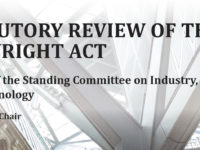In December 2017, the Canadian government launched its much-anticipated and much-lobbied review of Canadian copyright law, tasking the Standing Committee on Industry, Science and Technology to lead the way. After months of study and hundreds of witnesses and briefs, the committee released its authoritative report with 36 recommendations earlier this month. Carys Craig, a law professor at Osgoode Hall Law School and one of Canada’s leading copyright law experts, joins the podcast to help sort through the report and to consider what it means for the future of Canadian copyright law.
Post Tagged with: "fair dealing"
Fixing Fair Dealing for the Digital Age: What Lies Behind the Copyright Review’s Most Important Recommendation
The long-awaited Canadian copyright review report features numerous good recommendations, many of which were rejections of industry lobbying: a rejection of new restrictions on fair dealing for education, rejection of Bell’s FairPlay site blocking initiative, and rejection of limits on safe harbours in response to the so-called “value gap.” Yet the most notable recommendation is the committee’s support for fair dealing for the digital age by expanding its scope and ensuring that it applies equally in the analog and digital worlds.
I wrote about the need to fix fair dealing for the digital age in May 2018:
The Authoritative Canadian Copyright Review: Industry Committee Issues Balanced, Forward-Looking Report on the Future of Canadian Copyright Law
In December 2017, the government launched its copyright review with a Parliamentary motion to send the review to the Standing Committee on Industry, Science and Technology. After months of study and hundreds of witnesses and briefs, the committee released the authoritative review with 36 recommendations that include expanding fair dealing, a rejection of a site blocking system, and a rejection of proposals to exclude education from fair dealing where a licence is otherwise available. The report represents a near-total repudiation of the one-sided Canadian Heritage report that was tasked with studying remuneration models to assist the actual copyright review. While virtually all stakeholders will find aspects they agree or disagree with, that is the hallmark of a more balanced approach to copyright reform.
The “Bulte Report” Redux: Canadian Heritage Committee Releases Embarrassingly One-Sided Remuneration Models Study
The Canadian government announced its plans for a copyright review in December 2017, tasking the Standing Committee on Industry, Science and Technology with the review. That report has been in the drafting stage for several months and is expected before the summer. In an effort to dampen concerns that Canadian Heritage would play a diminished role in the review, the responsible ministers asked the Industry committee to ask the Heritage committee to conduct a review on remuneration models for artists and creative industries. The formal request asked the Standing Committee on Canadian Heritage to “call upon the expertise of a broad range of stakeholders impacted by copyright to ensure a holistic understanding of the issues at play.”











